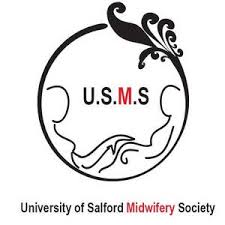My Blog

Yesterday I was honoured to be invited to speak to around 250 midwifery students at The University of Salford Midwifery Society (U.S.M.S) Conference. The theme was ‘Vulnerability in Childbearing: the diverse role of the midwife in addressing inequality. #USMSCON14
The lecture theatre buzzed with a positive air of enthusiasm at the student-led event. First presentation was by Peggy Mulongo who gave an excellent talk to raise awareness and some key facts about Female Genital Mutilation (FGM). I was shocked at how prevalent this is and pleased that these students were alerted to the realities and information, e.g. WHO fact sheet, NHS Choices.
Next was Dame Tina Lavender, who was inspirational on the need for midwifery research and shared with us some of the work she is involved with in Africa, using Globalization as the context. We have much to learn from and share with other countries concerning Midwifery.
I presented next, using the title ‘Small actions, big differences: How midwifery care can improve perinatal mental health.’ I shared my story and highlighted some of the key areas that I feel midwives can help, e.g. by making positive choices, communicating well and caring for themselves and others. I do strongly believe the importance and value of compassion and care.
I was delighted with the stream of Tweets that followed during and after my talk.
The morning concluded with a motivational presentation by Dr Lesley Choucri, Director of Midwifery, Counselling & Psychotherapy at the University of Salford. She spoke about the importance of connections and Intelligent Kindness. It is not surprising that under her leadership, the whole team and students are so inspired!
The afternoon had workshops about the Mother and Baby unit at Wythenshawe; Women Offenders; Disadvantaged families and strengthening families; plus Domestic Abuse.
I also had the pleasure of meeting Pete Wallroth and Nicolette Peel from the charity ‘ Mummy’s Star’. It is the only UK charity with the aim of ‘supporting pregnancy through cancer and beyond’. More specifically the charity focuses on supporting women/families:
- Diagnosed or treated for cancer during pregnancy
- Diagnosed or treated for cancer within of year of a birth
- who in the first year after pregnancy lose a spouse (female or male)
I remembered seeing them on BBC Breakfast last year because it struck a chord with me then about how how having cancer and/or bereavement involved around pregnancy and birth must be awful. Read Mair’s story and why the charity was set up. Please do visit their website and share with others involved in the area of new families so you will know where appropriate support and information can be found.
Congratulations to all those involved in such an informative and well-organised day.
Meanwhile I continue to work on my second book. It was great to be away from my desk and then return re-inspired myself!
Here are some other new resources that you may find useful, recently posted by www.chimat.org.uk
Best Beginnings: Download the Big Lottery funded Baby Buddy app for free on iOS and Android now
Download and give feedback on version 1.0 of Baby Buddy, created to support young parents in their physical and emotional transition to parenthood and to help them maximise their babies’ health and wellbeing. Healthcare professionals can order free leaflets and posters about Baby Buddy which is endorsed by the RCM, RCPCH, RCOG, RCSLT, CPHVA and iHV.
http://www.chimat.org.uk/resource/view.aspx?RID=211976&src=pimh
All babies count: the Dad Project
This report presents advice on working with new and expectant fathers, from the Dad Project which involved working with dads to look at how to support them during pregnancy and the first year of their child’s life.
http://www.chimat.org.uk/resource/view.aspx?RID=211760&src=pimh
Antidepressant treatment for postnatal depression (Intervention review)
This review was undertaken to evaluate the effectiveness of different antidepressants and to compare their effectiveness with other forms of treatment, placebo or treatment as usual. It is an update of a review first published in 2001.
http://www.chimat.org.uk/resource/view.aspx?RID=212414&src=pimh
A systematic review of perinatal depression interventions for adolescent mothers
Poor, adolescent, racial/ethnic minority women are at great risk for developing perinatal depression. However, little research has been conducted evaluating interventions for this population.
http://www.chimat.org.uk/resource/view.aspx?RID=212925&src=pimh
Back to writing now!
Elaine 🙂




